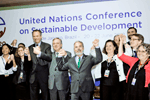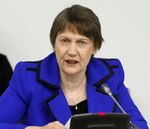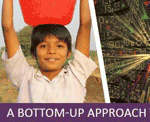News
Published on Tue, 2012-06-26 15:16

European Social Forum in
Florence, 2002. (Photo: ESF)
|
The next edition of the European Social Forum (ESF) will be held in Florence, from November 8-11, ten years after the first one, that convened under the slogan "against war, racism and neo-liberalism" in the same Italian city. In November, this alliance of humanitarian and environmental movements, trade unions, non governmental organizations and other institutions committed with human rights and the world peace will dialogue in a very different situation.
|
Published on Thu, 2012-06-21 17:38

Photo; Navdanya International
|
More than 100 heads of State and government prepare to approve on Friday in Rio de Janeiro, Brazil, the outcome document of the United Nations Conference on Sustainable Development (Rio2012). After intensive and protracted informal negotiations, representatives of 191 countries reached an agreement on Tuesday.
|
Published on Thu, 2012-06-21 17:31

Helen Clark. (UN Photo)
|
A high-level forum at the UN Conference on Sustainable Development (Rio2012) offered this week an opportunity to debate how to measure the social progress of the countries and the whole world without merely depending on economic indicators, and assessing at the same time the damage caused by human activities to the well-being of the future generations.
|
Published on Thu, 2012-06-21 17:19

Photo: Philipp Rohrer/Alliance Sud
|
The "Corporate Justice" petition was signed by 135.285 people. This campaign urges the Federal Council of Switzerland and the Parliament to compel Swiss transnational corporations to respect human rights and the environment worldwide, reported Alliance Sud, focal point of Social Watch in the European country.
According to the campaign, subsidiaries of Swiss transnational companies such as Xstrata, Glencore, Syngenta, Nestlé, Danzer, Triumph and Holcim violate human rights or pollute the environment abroad, while there is no way for the parent companies to be held accountable.
|
Published on Wed, 2012-06-20 19:33
Five leading civil society international networks urged the European Union (EU) head of State and Government to “demonstrate a commitment” to ensure at Rio2012 “that policies and practices pursued” within and outside the bloc “are consistent with the principles of sustainable development”.
|
Published on Mon, 2012-06-18 16:04

Photo: ANND
|
“The popular mobilization” in the Arab world “would not calm whatever the difficulties were until the achievement of the desired goals,” said Ziad Abdel Samad, Executive Director ofhe Arab NGO Network for Development (ANND), after its most recent General Assembly, held on 29-30 May in Beirut.
|
Published on Fri, 2012-06-15 20:10
by Roberto Bissio
Twenty years ago, the concept of “sustainable development” was adopted at the highest level in Rio de Janeiro to simultaneously aim at preserving the planet for future generations and promoting a sound development to meet the needs of the present ones. Twenty years after, the volume of international trade has multiplied by five and the per capita world income has doubled to around ten thousand dollars a year. And yet sustainable development is far from being achieved. Increased resources has not accelerated poverty reduction and instead social inequality is on the rise in most countries, North and South, while the unsustainable production and consumption patterns have already overstepped several “planetary boundaries.”
|
Published on Thu, 2012-06-14 08:36

Photo: Chad Magiera/Flickr/CC
|
The international community must find new indicators to measure the performance of the countries and the world on economy, equity, well-being, human rights and sustainability, suggests the Civil Society Reflection Group on Global Development Perspectives, made up of 18 leading activists and scholars from all over the planet.
|
Published on Wed, 2012-06-13 15:33
“Human rights considerations have no place” in the discussions of the Group of 20 (G20), “nevertheless their actions have significant impacts on the realization and enjoyment of human rights,” and the members of the bloc “cannot disregard their human rights obligations in any forum, including multilateral economic institutions,” warned the initiative "A bottom up approach to righting financial regulation" in its fourth issue.
|
Published on Tue, 2012-06-12 08:26

Danish minister Ida Auken, EU
commissioner Janez Potocnik
and Danish expert Mikkel
Aaro-Hansen at the Environment
Counicil this week.
(Photo: European Council)
|
Civil society organizations from around the world are calling on the EU to unreservedly re-commit, in both letter and spirit, to the Rio principles adopted 20 years ago. EU Environment Ministers, who meet in Luxembourg on Monday 11 June, are being urged to demonstrate that EU policies and practices pursued within and outside the EU will be consistent with the principles of sustainable development.
|
SUSCRIBE TO OUR NEWSLETTER
Submit

|











